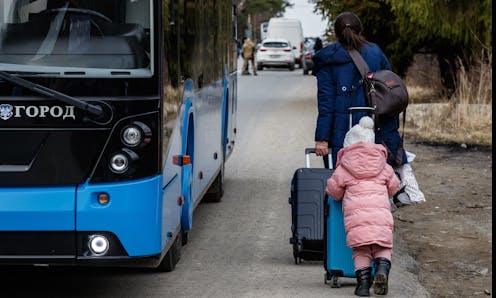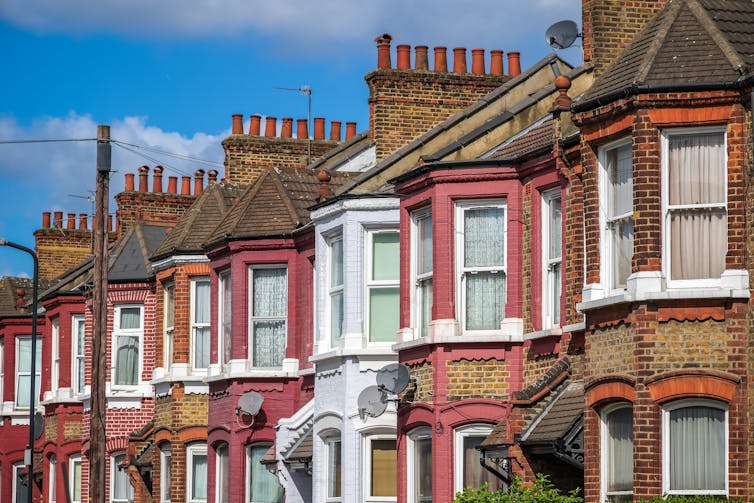
When Russia invaded Ukraine in February 2022, thousands of people were forced to leave their homes in search of safety. A year and a half later, many of those Ukrainian refugees who reached the UK are again finding themselves homeless.
Government statistics published on August 15 show that 7,300 Ukrainian households have been classified as homeless, including 4,740 households with children. These figures apply to England only and are based on information submitted by 67% of local authorities – the true extent of the problem is probably greater.
Since February 2022, over 180,000 Ukrainians have arrived in the UK via two housing schemes. The Ukraine Family Scheme allows Ukrainians to join family members who are already based in the UK, while Homes for Ukraine allows UK citizens to host Ukrainian nationals with no links to the UK.
Each homelessness case has its own individual and complex set of causes, but overall, there are three factors influencing the trend: a breakdown in hosting arrangements, problems accessing long-term housing (particularly in the private rented sector), and inconsistent and insufficient support for refugees.
My analysis shows that the UK government moved quickly to introduce housing policy for displaced Ukrainians. The schemes were broader in scope than what is provided to many other groups arriving in the UK (and certainly compared to the general UK asylum system).
However, the schemes rely on the goodwill and capacity of the public to accommodate Ukrainian nationals who have multiple needs. In many instances, these arrangements will, inevitably, be short term. Hosts in the Homes for Ukraine scheme were asked to provide accommodation for six months, receiving a “thank-you payment” from the government of £350 per month, which increases to £500 if the arrangement extends beyond 12 months.
But reports indicate that for both hosts and their Ukrainian guests, accommodation arrangements “can’t go on forever”. Many end at the minimum six-month point. Some hosts feel that they want the space back in their home and that they can’t continue to accommodate a guest. For some hosts, the arrangements have proved more challenging than they were expecting.
Office for National Statistics research suggests that the cost of living crisis prevented many hosts from being able to continue providing accommodation. The number of people offering to host has dropped since the early months of the war, making it harder for Ukrainians to initially find a host or to be re-matched when an arrangement ends.
Despite local government checks on properties before a guest moves in, there have also been reports of overcrowding, safeguarding concerns and issues with landlords. Problems like this are also leading to housing arrangements ending prematurely.
Securing accommodation
When accommodation provided through one of the Ukrainian schemes is no longer available, most people will turn to the private sector to find housing. Generally, there are significant supply and affordability issues in the private sector, but Ukrainians often face additional barriers.
Some private landlords have refused to rent to Ukrainians who are receiving universal credit or cannot provide long-term proof of earnings. A survey from March 2023 showed that 49% of Ukrainian refugees were unable to provide a guarantor and 43% have insufficient funds for a deposit.
Over 80% of hosts have reported problems helping Ukrainian guests secure private accommodation. Alternative accommodation cannot always be secured in the same location, meaning families may have to leave school places and other support networks.

Local authorities received funding of £10,500 to support families accommodated during the first year of the Homes for Ukraine scheme. This has now stopped, and funding for new arrivals has halved. Local authorities have never received funding or placement information for arrivals under the Ukraine Family Scheme.
As the conflict persists, some charities and organisations that help to source housing placements have had to scale back their support. A survey of 1,200 Homes for Ukraine hosts found that only 12% had been provided with local authority support to help guests to find private rented accommodation.
Long-term change
I have called for changes to be made to both schemes, including increased payment for hosts and allowing Ukrainians to switch between Homes for Ukraine and the family scheme. Central government homelessness guidance needs to be updated to provide clearer information about appropriate responses for homeless Ukrainians.
The current schemes are set to last for three years. But halfway through, they are already proving unsuccessful. The government should commit to reviewing these arrangements before the second anniversary of the conflict, in February 2024.
Some local authorities have moved to provide rent deposits and incentives to local landlords to rent to Ukrainians. These actions need to be mainstream, not piecemeal. The statistics show a depressing increase in homelessness each month. These vulnerable people, initially welcomed warmly by the UK, deserve better.
Richard Machin is a member of the Labour Party and a board member of Church Action on Poverty.
This article was originally published on The Conversation. Read the original article.







